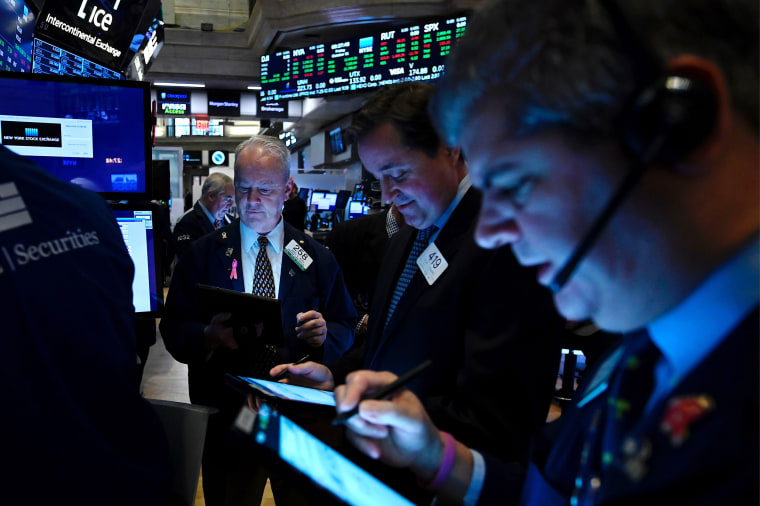Markets rallied Friday in expectation of a breakthrough for U.S.-China trade talks, although experts said the real economic impact of any deal unveiled Friday would be small.
“It feels like few people are holding out hope for a comprehensive deal,” said Mark Williams, chief Asia economist at Capital Economics.
Ahead of a meeting with Chinese Vice Premier Liu He on Friday, President Donald Trump tweeted, “Good things are happening at China Trade Talk Meeting. Warmer feelings than in recent past, more like the Old Days. I will be meeting with the Vice Premier today. All would like to see something significant happen!”
Markets, which had turned more optimistic after overnight reports that a deal could be coming, rose further in response, with the Dow Jones Industrial Average gaining as much as 450 points by midday.
“The prospects for a small deal between China and the U.S. are still pretty good because both presidents need to do something to help the world economy,” said Peter Petri, a professor of international finance at the Brandeis International Business School, but he added that the reality will probably be far less significant than the sweeping bargain the White House initially sought.
“I think the potential for a mini-deal is pretty clear and that would be somewhat calming, but it’s unlikely to lead to a deeper agreement,” said David Dollar, a senior fellow at the Brookings Institution.
While the parameters of this “mini-deal” won’t be known for certain until after the Trump-Liu meeting, experts said markets have a rough idea of what to expect.
The White House and China are expected to announce that Beijing will buy more agricultural products, particularly pork and soybeans, from the U.S.
“It seems like they’ve already begun to buy pork,” said Jacob Kirkegaard, a senior fellow at the Peterson Institute for International Economics, pointing out that a swine fever epidemic has decimated China’s domestic pork industry. “They want to contain domestic prices,” he said. “They’re not doing this just to please Trump. They’re doing this because it suits them.”
While there is little expectation that the Trump administration would roll back existing tariffs, a further delay of two looming deadlines would send a key signal to the markets about the trajectory for future trade relations: Oct. 15, when tariffs on $250 billion worth of Chinese imports is set to rise from 25 percent to 30 percent, and Dec. 15, when a 15 percent tariff is set to kick in on approximately $160 billion in imports, including a significant number of consumer goods such as clothes, toys, and electronics.
Experts say there is a good chance that these additional tariff threats will not come to fruition. “Come December, if this deal holds, I would expect this to be pushed back too, because that’s the one that has the most direct domestic political implications. You don’t want a bunch of consumer goods to go up in price potentially, significantly, in an election year,” Kirkegaard said.
If those tariffs are implemented as planned, it would mean that nearly all of the $550 billion worth of Chinese imports into the U.S. would be subject to tariffs.
“The most important potential outcome is to delay those or eliminate them,” said Scott Wren, senior global equity strategist at the Wells Fargo Investment Institute. “If the outcome of negotiations is that those escalations are going ahead, I think that’s going to have a very negative effect on market sentiment.”
Thornier — and more fundamental — trade issues pertaining to intellectual property protections, market access and America’s push for China to change its legislation around these and other contentious issues would likely fall by the wayside, analysts said. “There aren’t going to be any of these other issues addressed, unless Trump caves,” Kirkegaard said. “It certainly doesn’t address any of the structural issues… he went to war for.”
In focusing on the small picture, the White House is fighting a battle of diminishing returns in the China trade war, experts warn.
Petri said even a positive outcome wouldn’t have the impact it might have generated earlier, since it wouldn’t be interpreted as a first step, but more as a temporary ceasefire that would leave the fundamental uncertainties — and potentially punishing tariffs — in place until the U.S. presidential election next year.
“Neither country will make significant commitments since neither trusts the other to deliver anything substantial or long-lived,” he predicted. “The effects of a deal will not be large or lasting.”
And even any easing of current or future sanctions would still fail to unwind the economic harm they already have inflicted, Wren said. “It’s a bit of a relief but it actually doesn’t undo that damage that already been done by these tariffs.”
“It’s a ceasefire. It’s not a peace treaty,” Kirkegaard said. “It’s what the Chinese wanted all along.”
